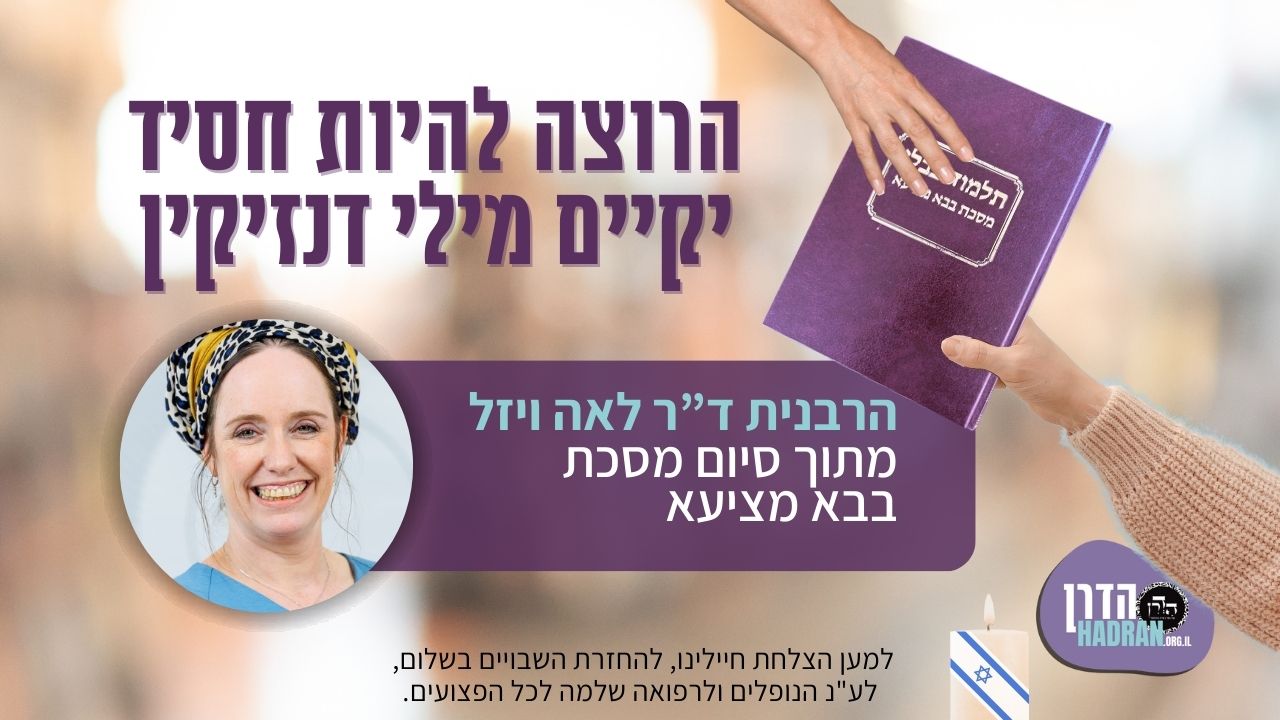הגמרא מביאה משנה בפאה ד:ט המתארת מחלוקת במי שלוקח פאה בעבור עני. עולא ורב נחמן חלוקים בשאלה האם המחלוקת משנה היא רק כאשר אדם עשיר לוקח לעני או אפילו עני לעני. רב נחמן מעלה קושי עם פסיקתו של עולא ממשנתנו. כיצד מבינים עולא ורב נחמן את המקרה במשנה אחרת כדי להתאים להבנתם את המשנה בפאה? נושה לא יכול לבקש ממישהו אחר לגבות חוב כאשר בעל החוב חייב גם לאחרים ואין לו מספיק כספים עבור כל הנושים שכן זה גורם הפסד לאחרים. רק הנושה עצמו יכול לגבות את ההלוואה. האם דין זה חל על מציאה מכיוון שבאופן תיאורטי החבר גורם לכל השאר העולם הפסד כי הם לא יוכלו עכשיו לזכות במציאה או האם אנחנו תופסים את זה כמונע מהם רווח פוטנציאלי אבל לא הספד? רב נחמן ורב חסדא חולקים על רבי יוחנן בשאלה זו. המשנה פוסקת שמי שנופל על פריט אינו רוכש אותו. ריש לקיש מביא הלכה בשם רבי אבא כהן ברדלא שאדם קונה הכל בתוך ארבע אמות הסובבות אותו. נגד קביעה זו מתעורר קושי גם ממשנה בפאה וגם משנתנו ומובאות שלוש תשובות לכל מקור להסביר מדוע אינו סותר, הראשונה נדחה ושתי האחרונות מתקבלות. ריש לקיש ורבי יוחנן חולקים האם ניתן לתת גט לקטנה על ידי הנחתו בחצרה או בארבע אמות הסובבות אותה. ההצעה הראשונה היא שהטיעון מבוסס על האם דין חצר נלמד מיד או מדין שליחות. אולם הסבר זה נדחה.
רוצה להקדיש שיעור?
כלים
העמקה
רוצה להבין מה באמת קורה מתחת לפני השטח של הסוגיה?
שיעורים, פודקאסטים והרחבות של מיטב המורות שלנו יפתחו לך עוד זוויות וכיווני חשיבה.
חדשה בלימוד הגמרא?
זה הדף הראשון שלך? איזו התרגשות עצומה! יש לנו בדיוק את התכנים והכלים שיעזרו לך לעשות את הצעדים הראשונים ללמידה בקצב וברמה שלך, כך תוכלי להרגיש בנוח גם בתוך הסוגיות המורכבות ומאתגרות.
פסיפס הלומדות שלנו
גלי את קהילת הלומדות שלנו, מגוון נשים, רקעים וסיפורים. כולן חלק מתנועה ומסע מרגש ועוצמתי.
בבא מציעא י
מַתְנִיתִין מַנִּי – רַבָּנַן הִיא. אֶלָּא אִי אָמְרַתְּ בְּעָשִׁיר וְעָנִי מַחְלוֹקֶת, אֲבָל מֵעָנִי לְעָנִי דִּבְרֵי הַכֹּל זָכָה לוֹ, הָא מַנִּי? לָא רַבָּנַן וְלָא רַבִּי אֱלִיעֶזֶר!
whose opinion is expressed in the mishna? It is the opinion of the Rabbis, who hold that one cannot acquire an item for another in this manner. But if you say that the dispute is specifically in a case of a rich person and a poor person but in a case where the pe’a was gleaned by a poor person on behalf of a poor person everyone agrees that he acquired it on the latter’s behalf, in accordance with whose opinion is this mishna? It is neither in accordance with the opinion of the Rabbis nor in accordance with the opinion of Rabbi Eliezer.
אֲמַר לֵיהּ, מַתְנִיתִין דְּאָמַר תְּחִילָּה.
Ulla said to Rav Naḥman: The mishna is referring to a case where the one lifting the item said: I intended to acquire the item for myself at the outset; I never had intention to acquire it on behalf of the rider.
הָכִי נָמֵי מִסְתַּבְּרָא, דְּקָתָנֵי סֵיפָא: אִם מִשֶּׁנְּתָנָהּ לוֹ אָמַר אֲנִי זָכִיתִי בָּהּ תְּחִילָּה – לֹא אָמַר כְּלוּם. תְּחִילָּה בְּסֵיפָא לְמָה לִי? פְּשִׁיטָא, אַף עַל גַּב דְּלָא אָמַר תְּחִילָּה, תְּחִילָּה קָאָמַר. אֶלָּא לָאו הָא קָא מַשְׁמַע לַן, רֵישָׁא דְּאָמַר ״תְּחִילָּה״.
The Gemara adds: So too, it is reasonable to explain the mishna in this manner, as it teaches in the last clause: But if, after giving it to the one riding the animal he said: I acquired it for myself at the outset, he has said nothing and the rider keeps the item. Why do I need the phrase: At the outset, to be mentioned in the last clause? It is obvious that even if he did not explicitly say: At the outset, he meant that he acquired it at the outset, before he gave it to the rider. Rather, isn’t this phrase mentioned to teach us this: The first clause of the mishna is also referring a case where he said: I intended to acquire it for myself at the outset?
וְאִידַּךְ: תְּנָא סֵיפָא לְגַלּוֹיֵי רֵישָׁא. סֵיפָא, דְּאָמַר תְּחִילָּה. רֵישָׁא, דְּלָא אָמַר תְּחִילָּה.
And the other Sage, Rav Naḥman, is of the opinion that the mishna taught this phrase in the last clause of the mishna in order to shed light on the first clause. The last clause is referring to a case where he said that he acquired the item at the outset in order to indicate that in the first clause, the one who lifts the item acquires it even in a case where he did not say that he acquired it for himself at the outset. In Rav Naḥman’s opinion, the rider does not acquire the item until it is given to him.
רַב נַחְמָן וְרַב חִסְדָּא דְּאָמְרִי תַּרְוַיְיהוּ: הַמַּגְבִּיהַּ מְצִיאָה לַחֲבֵירוֹ – לֹא קָנָה חֲבֵירוֹ.
§ The Gemara discusses the opinion of Rav Naḥman and Rav Ḥisda, who both say: In a case of one who performs an act of acquisition by lifting a found item on behalf of another, the other person, i.e., the latter, does not acquire ownership of the item.
מַאי טַעְמָא – הָוֵי תּוֹפֵס לְבַעַל חוֹב בִּמְקוֹם שֶׁחָב לַאֲחֵרִים, וְהַתּוֹפֵס לְבַעַל חוֹב בִּמְקוֹם שֶׁחָב לַאֲחֵרִים – לֹא קָנָה.
What is the reason for this? The reason is that it is a case of one who seizes assets for a creditor in a situation that will result in a disadvantage for others, as the debtor owes money to other creditors as well; and one who seizes assets for a creditor in a situation that will result in a disadvantage for others does not acquire the assets for him. Although a creditor can himself seize the assets as payment for the debt, no one else can take action that will benefit one person at the expense of others. Similarly, since everyone has equal rights to an ownerless item that is found, one person cannot deprive all others of that right on behalf of another person.
אֵיתִיבֵיהּ רָבָא לְרַב נַחְמָן: מְצִיאַת פּוֹעֵל לְעַצְמוֹ.
Rava raised an objection to the opinion of Rav Naḥman from a baraita: The found item of a laborer, i.e., something that he found, belongs to him and not to the employer for whom he is working at that time.
בַּמֶּה דְּבָרִים אֲמוּרִים – בִּזְמַן שֶׁאָמַר לוֹ בַּעַל הַבַּיִת ״נַכֵּשׁ עִמִּי הַיּוֹם״, ״עֲדוֹר עִמִּי הַיּוֹם״. אֲבָל אָמַר לוֹ ״עֲשֵׂה עִמִּי מְלָאכָה הַיּוֹם״ – מְצִיאָתוֹ שֶׁל בַּעַל הַבַּיִת הוּא!
In what case is this statement, that the item belongs to the laborer, said? It is said when the employer told the laborer to perform a specific task, e.g., he said to him: Weed for me today, or: Till for me today. Since the employer specified the task that he hired the laborer to perform, the laborer has rights to the item that the laborer found. But if the employer said to the laborer: Work for me today, without specifying the nature of the work, the found item is the employer’s, as finding ownerless items is included within the general category of work. This indicates that a laborer can acquire an item for someone else, which contradicts Rav Naḥman’s principle.
אֲמַר לֵיהּ: שָׁאנֵי פּוֹעֵל, דְּיָדוֹ כְּיַד בַּעַל הַבַּיִת הוּא.
Rav Naḥman said to him: A laborer is different, as his hand is like the hand of the employer. He is considered his agent while he is working for him.
וְהָאָמַר רַב: פּוֹעֵל יָכוֹל לַחֲזוֹר בּוֹ אֲפִילּוּ בַּחֲצִי הַיּוֹם!
Rava responded: But doesn’t Rav say that a laborer may reconsider and quit his job, even at midday? Evidently, the relationship between the employer and the laborer is structured to the benefit of the laborer.
אֲמַר לֵיהּ: כֹּל כַּמָּה דְּלָא הָדַר בֵּיהּ, כְּיַד בַּעַל הַבַּיִת הוּא. כִּי הֲדַר בֵּיהּ, טַעְמָא אַחֲרִינָא הוּא, דִּכְתִיב: ״כִּי לִי בְנֵי יִשְׂרָאֵל עֲבָדִים, עֲבָדַי הֵם״ – וְלֹא עֲבָדִים לַעֲבָדִים.
Rav Naḥman said to him: As long as he does not retract his commitment, his hand is like the employer’s hand. When he does retract his commitment, he is able to do so. But this is not because matters are structured to the benefit of the laborer, but for a different reason, as it is written: “For to Me the children of Israel are slaves; they are My slaves whom I brought forth out of the land of Egypt” (Leviticus 25:55), which indicates: They are My slaves, and not slaves of slaves, i.e., of other Jews. Consequently, a Jew can never be enslaved to another Jew with a contract from which he cannot release himself whenever he wishes. Nevertheless, as long as the laborer does not quit the job, he is considered his employer’s agent.
אָמַר רַבִּי חִיָּיא בַּר אַבָּא אָמַר רַבִּי יוֹחָנָן: הַמַּגְבִּיהַּ מְצִיאָה לַחֲבֵירוֹ – קָנָה חֲבֵירוֹ. וְאִם תֹּאמַר מִשְׁנָתֵינוּ, דְּאָמַר ״תְּנָהּ לִי״, וְלָא אָמַר ״זְכָהּ לִי״.
Contrary to the opinion of Rav Naḥman and Rav Ḥisda, Rabbi Ḥiyya bar Abba says that Rabbi Yoḥanan says: In a case of one who performs an act of acquisition by lifting a found item on behalf of another, the other person acquires ownership of the item. And if you say that our mishna seems to suggest otherwise, it is referring to a case where the rider says to the pedestrian: Give it to me, but does not say: Acquire it for me. If he says give it to me, the rider acquires the item only when it reaches his possession. If he says acquire it for me, the rider acquires the item as soon as the pedestrian lifts it.
מַתְנִי׳ רָאָה אֶת הַמְּצִיאָה וְנָפַל עָלֶיהָ, וּבָא אַחֵר וְהֶחְזִיק בָּהּ – זֶה שֶׁהֶחְזִיק בָּהּ זָכָה בָּהּ.
MISHNA: If one saw a found item and fell upon it, intending to thereby acquire it, but did not employ one of the formal modes of acquisition, and then another came and seized it, the one who seized it acquired it because he employed one of the formal modes of acquisition.
גְּמָ׳ אָמַר רֵישׁ לָקִישׁ מִשּׁוּם אַבָּא כֹּהֵן בַּרְדְּלָא: אַרְבַּע אַמּוֹת שֶׁל אָדָם קוֹנוֹת לוֹ בְּכׇל מָקוֹם. [מַאי טַעְמָא] תַּקִּינוּ רַבָּנַן, דְּלָא (אָתֵי) [לֵיתוֹ] לְאִנְּצוֹיֵי. אָמַר אַבָּיֵי: מוֹתֵיב רַבִּי חִיָּיא בַּר יוֹסֵף פֵּיאָה. אָמַר רָבָא: מוֹתֵיב רַבִּי יַעֲקֹב בַּר אִידִי נְזִיקִין.
GEMARA: Reish Lakish says in the name of Abba Kohen Bardela: The area of four square cubits surrounding a person has the legal status of his courtyard, and it effects acquisition of every ownerless item located there for him, everywhere. What is the reason for this? The Sages instituted this ordinance so that people would not come to quarrel over an item. Abaye said that Rabbi Ḥiyya bar Yosef raises an objection to this from a mishna in tractate Pe’a. Rava said that Rabbi Ya’akov bar Idi raises an objection to this from a mishna in Nezikin.
אָמַר אַבָּיֵי, מוֹתֵיב רַבִּי חִיָּיא בַּר יוֹסֵף פֵּיאָה: נָטַל מִקְצָת פֵּיאָה וְזָרַק עַל הַשְּׁאָר – אֵין לוֹ בָּהּ כְּלוּם. נָפַל לוֹ עָלֶיהָ, פֵּרַס טַלִּיתוֹ עָלֶיהָ – מַעֲבִירִין אוֹתוֹ הֵימֶנָּה. וְכֵן בְּעוֹמֶר שִׁכְחָה.
The Gemara elaborates: Abaye said that Rabbi Ḥiyya bar Yosef raises an objection to this from a mishna in tractate Pe’a (4:3), which states: If a poor person took some of the pe’a in the field and threw it on the rest of the pe’a in order to acquire it, he has nothing of it. The same is true if he fell upon the pe’a, or if he spread his garment over it; others may remove him or his garment from the pe’a in order to take it for themselves, as he did not acquire it. And the same is true in the case of a forgotten sheaf left for the poor; a poor person cannot acquire it in any of these manners.
וְאִי אָמְרַתְּ אַרְבַּע אַמּוֹת שֶׁל אָדָם קוֹנוֹת לוֹ בְּכׇל מָקוֹם, נִקְנוֹ לֵיהּ אַרְבַּע אַמּוֹת דִּידֵיהּ!
Rabbi Ḥiyya bar Yosef continues: And if you say that a person’s area of four square cubits effects acquisition of property for him everywhere, let his area of four square cubits effect acquisition of the pe’a or the forgotten sheaf for him.
הָכָא בְּמַאי עָסְקִינַן – דְּלָא אֲמַר ״אֶקְנֵי״.
The Gemara responds: With what are we dealing here? We are dealing with a case where he did not say: I will acquire the pe’a through this action. He performed the action without revealing his intention; therefore, his acquisition is ineffective.
וְאִי תַּקּוּן רַבָּנַן, כִּי לָא אֲמַר מַאי הָוֵי?!
The Gemara asks: But if the Sages instituted an ordinance that the area of four cubits surrounding a person acquires property for him, then even in a case where he did not say: I will acquire the produce, what of it? Shouldn’t he have acquired it even without expressing his intent to do so?
כֵּיוָן דִּנְפַל, גַּלִּי דַּעְתֵּיהּ דְּבִנְפִילָה נִיחָא לֵיהּ דְּנִקְנֵי, בְּאַרְבַּע אַמּוֹת לָא נִיחָא לֵיהּ דְּנִקְנֵי.
The Gemara answers: This case is different. Since he fell upon it he thereby revealed his intention: That it is satisfactory for him to acquire the produce by falling on it and it is not satisfactory for him to acquire the produce through the ordinance concerning his four square cubits. Since he decided to forgo the mode of acquisition that the Sages instituted, and falling on the produce is not a valid mode of acquisition, he did not acquire the produce.
רַב פָּפָּא אָמַר: כִּי תַּקִּינוּ לֵיה רַבָּנַן אַרְבַּע אַמּוֹת – בְּעָלְמָא, בְּשָׂדֶה דְּבַעַל הַבַּיִת לָא תַּקִּינוּ לֵיה רַבָּנַן. וְאַף עַל גַּב דִּזְכָה לֵיהּ רַחֲמָנָא בְּגַוַּהּ, כִּי זְכָה לֵיהּ רַחֲמָנָא – לְהַלּוֹכֵי בַּהּ וּלְנַקּוֹטֵי פֵּיאָה, לְמִיהְוֵי חֲצֵירוֹ לָא זְכָה לֵיהּ רַחֲמָנָא.
Rav Pappa said a different answer: When the Sages instituted an ordinance that one’s four square cubits effect acquisition of property for him, that was in the world, i.e., on public land. But the Sages did not institute this mode of acquisition for him in a field belonging to an owner. And even though the Merciful One accorded a poor person certain rights in a landowner’s field during the distribution of pe’a, this mode of acquisition is not included in those rights; when the Merciful One accorded him rights it was specifically to walk in the field and to collect pe’a, but the Merciful One did not accord him the right that the field be considered his courtyard with regard to acquiring pe’a. Therefore, the mishna in tractate Pe’a does not contradict the statement of Reish Lakish.
אָמַר רָבָא, מוֹתֵיב רַבִּי יַעֲקֹב בַּר אִידִי נְזִיקִין: רָאָה אֶת הַמְּצִיאָה וְנָפַל לוֹ עָלֶיהָ וּבָא אַחֵר וְהֶחְזִיק בָּהּ, זֶה שֶׁהֶחְזִיק בָּהּ זָכָה בַּהּ. וְאִי אָמְרַתְּ אַרְבַּע אַמּוֹת שֶׁל אָדָם קוֹנוֹת לוֹ בְּכׇל מָקוֹם – נִקְנוֹ לֵיהּ אַרְבַּע אַמּוֹת דִּידֵיהּ!
As mentioned previously, Rava said that Rabbi Ya’akov bar Idi raises an objection to this from a mishna in Nezikin. The Gemara elaborates: The mishna here states that if one saw a found item and fell upon it, and another came and seized it, the one who seized it acquired it. And if you say that a person’s four square cubits effect acquisition of property for him everywhere, let his four square cubits effect acquisition of the found item for him.
הָכָא בְּמַאי עָסְקִינַן, דְּלָא אֲמַר ״אֶקְנֵי״. וְאִי תַּקּוּן רַבָּנַן, כִּי לָא אֲמַר מַאי הָוֵי! כֵּיוָן דְּנָפַל עָלֶיהָ, גַּלִּי דַּעְתֵּיהּ דְּבִנְפִילָה נִיחָא לֵיהּ דְּנִקְנֵי, בְּאַרְבַּע אַמּוֹת לָא נִיחָא לֵיהּ דְּנִקְנֵי.
The Gemara answers: Here we are dealing with a case where he did not say: I will acquire it. The Gemara asks: But if the Sages instituted an ordinance that one’s four square cubits effect acquisition of property for him, then even in a case when he did not say: I will acquire the item, what of it? The item should still be his. The Gemara answers: Since he fell upon it, he revealed his intention that it is satisfactory for him to acquire the item by falling on it, and it is not satisfactory for him to acquire the item through the ordinance concerning his four square cubits. Since he decided to forgo the mode of acquisition instituted by the Sages, he does not acquire the found item.
רַב שֵׁשֶׁת אָמַר: כִּי תַּקִּינוּ רַבָּנַן, בְּסִמְטָא דְּלָא דָּחֲקִי רַבִּים. בִּרְשׁוּת הָרַבִּים דְּקָא דָחֲקִי רַבִּים, לָא תַּקִּינוּ רַבָּנַן.
Rav Sheshet said a different answer: When the Sages instituted that one’s four square cubits effect acquisition of property for him, that was in a place like an alleyway, where the multitudes do not crowd, so the four square cubits surrounding a person can temporarily be considered his property and enable him to acquire an item; but the Sages did not institute this mode of acquisition in the public domain, where the multitudes crowd.
וְהָא בְּכׇל מָקוֹם קָאָמַר!
The Gemara asks: But doesn’t the wording of Reish Lakish’s statement indicate that there is no such limitation, as he says that the area of four square cubits surrounding a person effects acquisition of property for him everywhere? The indication is that this is true even in the public domain.
כׇּל מָקוֹם – לְאֵתוֹיֵי צִידֵּי רְשׁוּת הָרַבִּים.
The Gemara answers: The word everywhere is not to be taken literally; it was stated to include even the sides of the public domain, areas that are adjacent to the public domain but not actually part of it. Since the multitudes do not crowd there, one who is standing there acquires an item that is in his four square cubits.
וְאָמַר רֵישׁ לָקִישׁ מִשּׁוּם אַבָּא כֹּהֵן בַּרְדְּלָא: קְטַנָּה אֵין לָהּ חָצֵר, וְאֵין לָהּ אַרְבַּע אַמּוֹת. וְרַבִּי יוֹחָנָן מִשּׁוּם רַבִּי יַנַּאי אָמַר: יֵשׁ לָהּ חָצֵר, וְיֵשׁ לָהּ אַרְבַּע אַמּוֹת.
§ And Reish Lakish says another halakha in the name of Abba Kohen Bardela: A minor girl does not have the ability to acquire property by means of her courtyard, and she does not have the ability to acquire property by means of her four square cubits. And Rabbi Yoḥanan says in the name of Rabbi Yannai that she has the ability to acquire property by means of her courtyard, and she has the ability to acquire property by means of her four square cubits.
בְּמַאי קָמִיפַּלְגִי? מָר סָבַר חָצֵר מִשּׁוּם יָדָהּ אִיתְרַבַּאי, כִּי הֵיכִי דְּאִית לַהּ יָד – חָצֵר נָמֵי אִית לַהּ. וּמָר סָבַר חָצֵר מִשּׁוּם שְׁלִיחוּת אִיתְרַבַּאי, וְכִי הֵיכִי דִּשְׁלִיחוּת לֵית לַהּ – חָצֵר נָמֵי לֵית לַהּ.
The Gemara asks: With regard to what do they disagree? The Gemara explains: One Sage, Rabbi Yannai, holds that placing an item in a courtyard is included as a valid means of acquisition due to the fact that it acts as her hand. Just as a minor girl has the ability to acquire property with her hand, she also has the ability to acquire property by means of her courtyard. And one Sage, Abba Kohen Bardela, holds that placing an item in a courtyard is included as a valid means of acquisition due to the option of acquiring property via agency; and just as a minor girl has no power of agency, as a minor cannot appoint an agent, she does not have the ability to acquire property by means of her courtyard either.
מִי אִיכָּא מַאן דְּאָמַר חָצֵר מִשּׁוּם שְׁלִיחוּת אִיתְרַבַּאי? וְהָתַנְיָא: ״בְּיָדוֹ״ – אֵין לִי אֶלָּא יָדוֹ. גַּגּוֹ, חֲצֵירוֹ וְקַרְפֵּיפוֹ מִנַּיִן – תַּלְמוּד לוֹמַר: ״הִמָּצֵא תִמָּצֵא״, מִכׇּל מָקוֹם.
The Gemara asks: Is there anyone who says that a courtyard is included as a valid means of acquisition due to the option of acquiring property via agency? But isn’t it taught in a baraita: The verse states: “If the theft shall be found in his possession alive, whether it is an ox, or a donkey, or a sheep, he shall pay double” (Exodus 22:3)” From the term “in his possession [beyado],” I have derived only a case where the stolen item is found in his hand [yado]. From where do I derive that the same halakha applies if it is found on his roof, in his yard, or in his enclosure? The verse states the repetitive phrase “if the theft shall be found [himmatze timmatze],” to indicate that the same halakha applies in any case, i.e., in any location that the stolen item is found.
וְאִי סָלְקָא דַעְתָּךְ חָצֵר מִשּׁוּם שְׁלִיחוּת אִיתְרַבַּאי, אִם כֵּן מָצִינוּ שָׁלִיחַ לִדְבַר עֲבֵירָה, וְקַיְימָא לַן אֵין שָׁלִיחַ לִדְבַר עֲבֵירָה!
The Gemara explains: And if it enters your mind that a courtyard is included as a valid means of acquisition due to agency, if so, we have found a case where there is agency for a transgression, i.e., theft. But we maintain that there is no agency for transgression. If one sends an agent to violate a transgression on his behalf, the agent is liable for the transgression and is not considered to be acting on behalf of the one who sent him.
אָמַר רָבִינָא: הֵיכָא אָמְרִינַן דְּאֵין שָׁלִיחַ לִדְבַר עֲבֵירָה – הֵיכָא דְּשָׁלִיחַ בַּר חִיּוּבָא הוּא, אֲבָל בְּחָצֵר דְּלָאו בַּר חִיּוּבָא הוּא – מִיחַיַּיב שׁוֹלְחוֹ.
Ravina said: That baraita poses no problem, as where do we say that there is no agency for transgression? It is where the agent himself is subject to liability for transgression. Consequently, the agent is liable, not the one who sent him. But in the case of a courtyard, which is not subject to liability, its sender, i.e., its owner, is liable.
אֶלָּא מֵעַתָּה, הָאוֹמֵר לְאִשָּׁה וְעֶבֶד: ״צְאוּ גִּנְבוּ לִי״ – דְּלָאו בְּנֵי חִיּוּבָא נִינְהוּ, הָכִי נָמֵי דְּמִיחַיַּיב שׁוֹלְחָן?!
The Gemara asks: If that is so, then in a case of one who says to a woman or a slave: Go out and steal for me, is the one who sent them indeed liable, since they are not subject to liability? Married women and slaves have no property of their own from which one could collect payment.
אָמְרַתְּ אִשָּׁה וְעֶבֶד – בְּנֵי חִיּוּבָא נִינְהוּ, וְהַשְׁתָּא מִיהָא לֵית לְהוּ לְשַׁלּוֹמֵי. דִּתְנַן: נִתְגָּרְשָׁה הָאִשָּׁה, נִשְׁתַּחְרֵר הָעֶבֶד – חַיָּיבִין לְשַׁלֵּם.
The Gemara answers: You can say in response: A woman and a slave are not comparable to a courtyard, as they are subject to liability if they steal; and only now, in any event, they do not have the means to pay. This is as we learned in a mishna (Bava Kamma 87a) concerning a married woman or Canaanite slave who injured another person: If the woman becomes divorced or the slave becomes emancipated, and they then have their own money, they are liable to pay for the damage they inflicted. Evidently, although it is not possible to collect payment from them, they are liable for their actions.
רַב סַמָּא אָמַר: הֵיכָא אָמְרִינַן אֵין שָׁלִיחַ לִדְבַר עֲבֵירָה – הֵיכָא דְּאִי בָּעֵי עָבֵיד וְאִי בָּעֵי לָא עָבֵיד, אֲבָל חָצֵר דִּבְעַל כֻּרְחֵיהּ מוֹתֵיב בַּהּ, מִיחַיַּיב שׁוֹלְחוֹ.
Rav Samma stated a different resolution to the difficulty based on the baraita: Where do we say that there is no agency for transgression? It is specifically in a case where if the agent wants to execute his assignment he can do so, and if he wants to refrain from executing it he can also opt to not do it. But in the case of a courtyard, where one places items without its consent, its sender, i.e., its owner, is liable.
מַאי בֵּינַיְיהוּ? אִיכָּא בֵּינַיְיהוּ כֹּהֵן דְּאָמַר לֵיהּ לְיִשְׂרָאֵל: צֵא וְקַדֵּשׁ לִי אִשָּׁה גְּרוּשָׁה, אִי נָמֵי אִישׁ דְּאָמַר לַהּ לְאִשָּׁה: אַקִּפִי לִי קָטָן.
The Gemara asks: What is the practical difference between the answers of Ravina and Rav Samma? The practical difference between them is in the case of a priest who said to an Israelite: Go out and betroth a divorced woman for me. It is prohibited for a priest to betroth a divorcée, while it is permitted for an Israelite to do so. Alternatively, the difference is in the case of a man who said to a woman: Round the corners of the head of a minor boy for me. Rounding the corners of a man’s head, and a man having the corners of his head rounded, are prohibited in the verse: “You shall not round the corners of your head” (Leviticus 19:27), but they are prohibited only for men and not for women.
לְהָךְ לִישָּׁנָא דְּאָמַר כֹּל הֵיכָא דְּאִי בָּעֵי עָבֵיד אִי בָּעֵי לָא עָבֵיד – לָא מִיחַיַּיב שׁוֹלְחוֹ. הָנֵי נָמֵי אִי בָּעֵי עָבֵיד, אִי בָּעֵי לָא עָבֵיד – לָא מִיחַיַּיב שׁוֹלְחָן. לְהָךְ לִישָּׁנָא דְּאָמְרַתְּ כֹּל הֵיכָא דְּשָׁלִיחַ לָאו בַּר חִיּוּבָא מִיחַיַּיב שׁוֹלְחוֹ, הָנֵי נָמֵי כֵּיוָן דְּלָאו בְּנֵי חִיּוּבָא נִינְהוּ – מִיחַיַּיב שׁוּלְחָן.
The Gemara explains: According to the formulation in which it was said that anywhere that if the agent wants to execute his assignment he can do so and if he wants to refrain from executing it he can opt to not do it the one who sent him is not liable for the transgression but rather the agent is liable, in these cases too, since if the agent wants to execute his assignment he can do so, and if he wants to refrain from executing it he can opt to not do it, the one who sent them is not liable. But according to the formulation in which it was said that wherever an agent is not subject to liability the one who sent him is liable, in these cases too, since the agents are not subject to liability, the one who sent them is liable.
וּמִי אִיכָּא לְמַאן דְּאָמַר חָצֵר לָאו מִשּׁוּם יָדָהּ אִיתְרַבַּאי? וְהָתַנְיָא: ״יָדָהּ״, אֵין לִי אֶלָּא יָדָהּ. גַּגָּהּ, חֲצֵירָהּ וְקַרְפֵּיפָהּ מִנַּיִן? תַּלְמוּד לוֹמַר: ״וְנָתַן״ מִכׇּל מָקוֹם!
The Gemara asks about the explanation of the opinion of Abba Kohen Bardela: But is there anyone who says that placing an item in a courtyard is not included as a valid means of acquisition due to the fact that it acts as her hand? But isn’t it taught in a baraita: From the verse: “And he writes her a scroll of severance, and he gives it in her hand” (Deuteronomy 24:1), I have derived only that a woman is divorced if her husband places the bill of divorce in her hand. From where is it derived that even if he places it on her roof, in her courtyard, or in her enclosure, she is divorced? The verse states: “And he gives,” indicating that she is divorced in any case. Apparently one’s courtyard is considered an extension of his hand with regard to acquiring property, in this case, the bill of divorce.
לְעִנְיַן גֵּט כּוּלֵּי עָלְמָא לָא פְּלִיגִי דְּחָצֵר מִשּׁוּם יָדָהּ אִיתְרַבַּאי, כִּי פְּלִיגִי לְעִנְיַן מְצִיאָה. מָר סָבַר:
The Gemara answers: With regard to a bill of divorce everyone agrees that placing an item in a courtyard is included as a valid means of acquisition due to the fact that it acts as her hand. When they disagree, it is with regard to acquiring a found item that was discovered in her courtyard. One Sage, Rabbi Yannai, holds that





































